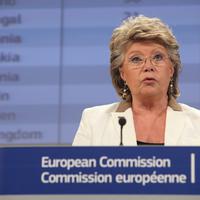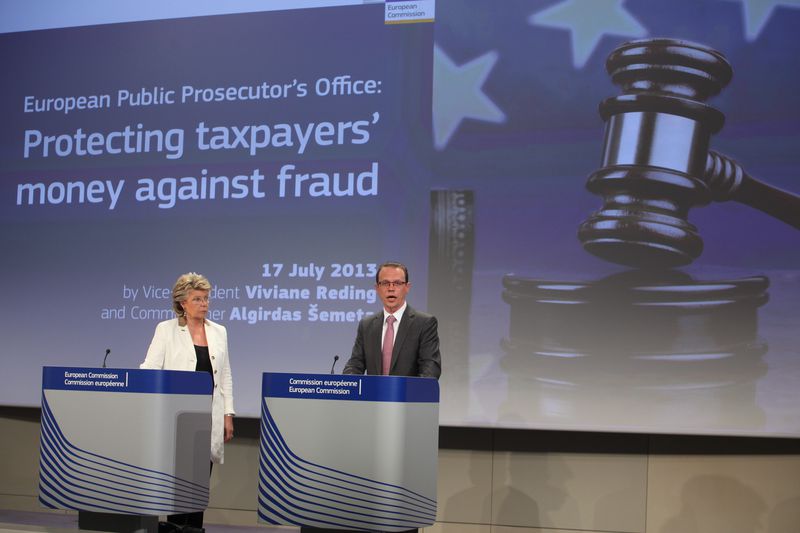European Prosecution - a Hope for European Taxpayers
Zhaneta Kuyumdzhieva, August 23, 2013
 "The criminals who take advantage of the flaws in legislation to embezzle money of the taxpayers should not be left unpunished because we do not have the appropriate tools to indict them", said Viviane Reding, vice president of the European Commission and commissioner for justice, on the occasion of the European Commission proposal from last month about the creation of a European prosecution that will fight embezzlement with EU funds. However, this statement reveals two worrying truths:
"The criminals who take advantage of the flaws in legislation to embezzle money of the taxpayers should not be left unpunished because we do not have the appropriate tools to indict them", said Viviane Reding, vice president of the European Commission and commissioner for justice, on the occasion of the European Commission proposal from last month about the creation of a European prosecution that will fight embezzlement with EU funds. However, this statement reveals two worrying truths:
1. Indeed, there was no set of tools against such a type of fraud and the recognition comes at a very late stage;
2. The absolute impossibility to postpone the creation of an effective defence and law enforcement in the entire EU - just like the budget itself consists of money from the entire EU and is managed by common rules.
That is why the promise that such a structure will start functioning from 1 January 2015 is like the coming true of at least five-year long expectations of citizens and euro-enthusiasts as well as of the result from the European Commission efforts which, through its president Jose Manuel Barroso (in his state of the union speech in September 2012), has confirmed its commitment to create it. From now on, in order for it to turn into law the proposal of the Commission has to be adopted by the member states (unanimously) after receiving the European Parliament's approval. If the Council cannot reach a unanimous decision, the Treaties envisage the possibility a group of at least nine member states to establish enhanced cooperation. The other countries have the right to request joining at any time. For now, the UK and Ireland will use the option of non-participation. Denmark, too, will not join the project.
Low results so far
Up to date, the existing EU bodies - the European office for fight against fraud (OLAF), the European agency for cooperation in the area of justice (Eurojust) and Europol - are not competent to do crime investigations or to prosecute fraud cases. OLAF can only hand the results of its administrative investigations to the competent national bodies which then decide independently whether to initiate penal proceedings on the basis of the office's findings.
So far, in many of the cases of embezzlement with EU funds penal proceedings were not launched or even if there were any proceedings there are huge discrepancies between the member states in terms of percentage of final sentences. The average success of penal proceedings of such types of crimes in the EU is 42.3%. According to data of the Commission, in the period 2006-2011 the cases that ended with court rulings had the lowest number in Greece (19.2% or five sentences of totally 86 cases, of which 26 ended with a ruling); Romania (23.4% or 30 sentences of totally 225 cases, of which 128 ended with a court ruling) and UK (23.1% or 3 sentences of totally 19 cases, 13 of which ended with a court ruling).
For Cyprus, Ireland, Malta and Slovenia there are no data, while for Hungary, Slovakia and Spain that share is 0%. In Bulgaria, 37 cases ended up in court, 14 of which have a court ruling and 6 of them ended up with sentences. That result is close to the Union's average. The best performing countries in the penal prosecution of crimes with the common budget are Austria, Estonia, Luxembourg, Sweden, Lithuania, Finland, France and Portugal.
Due to the relatively low share of success of prosecution only a small part of the overall amount of fraud money is actually recovered. According to the member states, due to possible embezzlement, around 500 million euros disappear every year. Because of the "bug in the system", which is the lack of adequate measures to handle fraud, the criminals find an excellent niche for unpunished deeds with the money for the European taxpayers.
It's time for a European approach
The ambition of the new independent institution, according to initial estimates, will be to review 2500 cases per year - on average 1500 cases of fraud investigated and reported to the EU by the bodies for administrative investigation of the member states; on average 300 cases of suspicion for fraud established by OLAF; around 500 cases annually of VAT fraud which currently are processed by the member states; and 200 cases led by the national investigation bodies.
The coverage of the entire EU by the European prosecution, as is the main idea, does not mean that national courts will not be competent on the essence of the case. The new body will have the right to demand or to order investigations thus turning into a prosecutor for the relevant courts of the member states. The implementation of this function is ensured by the decentralised structure which will be integrated in the national judiciaries.
European prosecutors will be delegated in local judiciary authorities who will conduct investigations and will open legal proceedings in the member states by using local staff and apply local legislation. A ten-member college, where the European prosecutor will also sit, his four deputies and five delegated prosecutors, will ensure the smooth cooperation between the EU and the national legislation, particularly by improving the common rules for case distribution. The courts in the member states will exert judicial oversight which means that the actions of the European prosecutors can be appealed.
The independence and accountability of the European prosecution will be guaranteed by the Union's institutions, as the Court of the EU has the right to remove the prosecutor in case of a serious breach.
OLAF's new functions
 With the introduction of the European prosecution changes are envisaged in the functions of OLAF - the European office for fight against fraud. As the new structure will practically take over OLAF's competence in conducting administrative investigations of fraud related to the EU, the office will handle illegal behaviour affecting Brussels's financial interests as well as the severest violations or crimes committed by EU officials which, in essence, do not cause financial damage.
With the introduction of the European prosecution changes are envisaged in the functions of OLAF - the European office for fight against fraud. As the new structure will practically take over OLAF's competence in conducting administrative investigations of fraud related to the EU, the office will handle illegal behaviour affecting Brussels's financial interests as well as the severest violations or crimes committed by EU officials which, in essence, do not cause financial damage.
OLAF will continue to cooperate with the European prosecution when asked to (as is currently the practise with national prosecutions). This change will facilitate the acceleration of the investigation process and will help avoid a duplication of administrative and penal proceedings in same circumstances. In this way, the chances for a successful prosecution will increase. The Commission will prepare changes of the regulation on OLAF that will reflect the changes of the role of the office and will additionally enhance its management when it holds investigations. In this regard, two key initiatives are envisaged:
- An independent controller of proceeding guarantees will be created to enhance oversight over the measures of investigation OLAF undertakes;
- The proceeding requirements will be increased with regard to the application of investigation measures- for instance searches of offices, confiscation of documents, etc.
What probably makes a lot of people breathe with relief from the news about the new prosecution is that, when needed and for the purposes of an investigation, it will have the right to demand waiver of immunity of an investigated individual, of course, according to the applicable national or European rules. For many of the citizens in Bulgaria, and probably in other countries, the so called immunity politicians are granted was a garment they would gladly tear apart. And with assistance from the outside, the exposure of public secrets before the court seems a bit more possible.
 Federica Mogherini | © Council of the EU
Federica Mogherini | © Council of the EU | © Council of the EU
| © Council of the EU Luis De Guindos | © Council of the EU
Luis De Guindos | © Council of the EU